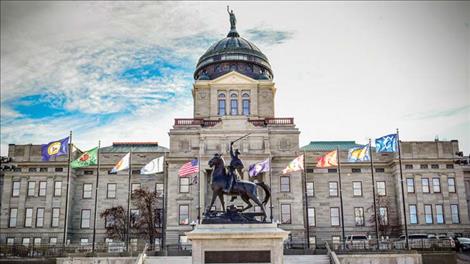67th Montana Legislature roundup from initiatives to tribal affairs
Hey savvy news reader! Thanks for choosing local.
You are now reading
1 of 3 free articles.
MONTANA – After a dash to wrap up work and consider bills before last week’s transmittal deadline, lawmakers returned to Helena to take up work that included advancing some tax cut proposals championed by Gov. Greg Gianforte, as well as proposals that LGBTQ advocates say would curb their civil rights.
Gianforte, reversing a position he took against the idea in 2016, and Lt. Gov. Kristen Juras threw their support behind a proposal that led to intense debate between bill proponents and advocates for LGBTQ civil rights.
On Thursday, Juras testified in favor of Senate Bill 215, also known as the “Montana Religious Freedom Restoration Act.” Juras’ support came during a House Judiciary Committee hearing. The Senate passed the bill earlier this month.
If passed, the bill would let people and entities claim exemption from laws and policies they say substantially burden the expression of their religious beliefs and limit when and how the government can regulate citizens’ expression of faith. But opponents say the measure would amount to sanctioning discrimination. The committee has yet to vote on the bill.
Ballot initiatives
Getting citizen initiatives on the ballot could become tougher if two proposals advanced by the House Judiciary Committee this week become law. House Bill 384 and House Bill 385 would double the number of signatures required for a change to statue or a constitutional amendment to reach voters via the ballot. The bills, sponsored by Rep. Steve Gunderson, R-Libby, passed out of the House Judiciary Committee along party lines on Wednesday.
Democrats on the committee said the current initiative system is working well, while Republicans countered that the changes would better represent Montana’s rural areas by making initiative promoters gather signatures from a broader swath of the state.
Taxes and budget
With lawmakers starting the second half of the session, tax cut proposals saw action and inaction. One of Gianforte’s tax cut priorities, among several Gianforte tax cut goals lawmakers are considering this session, is poised to be sent to the governor for his signature after the Senate passed it during its second vote Friday.
House Bill 303, also known as the Business Investment Grows Jobs Act, would lower the tax bill for 4,000 Montana businesses by raising the state business equipment tax exemption from $100,000 to $200,000. The proposal has already passed the House and needs to survive one more vote in the Senate. Supporters say it would spur small businesses to grow and hire more workers.
The House Taxation Committee on Friday also amended Gianforte’s proposed income tax cut, Senate Bill 159, to provide heftier reductions to taxes on higher-earning Montanans. The amendment would further decrease the income tax rate for taxable earnings above $18,500 to 6.5 percent. The bill, which has already passed the Senate, originally cut the rate from 6.9 percent to 6.75 percent. Another Gianforte-backed bill, Senate Bill 181, implementing corporate income tax reform, has now been in committee for a month without a vote.
Natural resources and energy
House Bill 302, sponsored by Rep. Josh Kassmier, R-Fort Benton, passed its second vote Friday. The measure would require county commissioners to sign off on bison relocations within their jurisdiction, and would protect livestock producers from brucellosis exposure, proponents have said.
Members of the Legislature’s American Indian caucus, however, argued that it’s an attack on tribal sovereignty and will subject the state to litigation. The proposal comes after lawmakers last month tabled two bills that would have reduced the number of bison shipped to slaughter after exiting Yellowstone National Park in favor of increasing brucellosis quarantine capacity on tribal land.
An attempt to open closed roads managed by federal agencies, like roads in national forests, failed to advance beyond a second vote Thursday. House Bill 418, sponsored by Rep. Steve Gunderson, R-Libby, fell one vote shy of the 51-vote threshold to advance, signaling that the proposal is likely dead this session. Proponents said it would open access to tens of thousands of miles of closed roads, while opponents countered that litigation has followed states that have tried similar strategies, and that the bill could create unintended negative consequences for private property owners.
The House passed HB 170, “Revise laws to include renewable hydrogen,” with broad support Friday. Sponsor, Rep. Tom Welch, R-Dillon, said his measure is a job creator that could make the state a leader in renewable energy technology. Opponent Rep. Mary Ann Dunwell, D-Helena, said she wanted to support the bill, but ultimately sees it as a tax break for fossil fuel plants, given that just a small percentage of hydrogen production is required to take advantage of the proposal.
Tribal affairs
The House Appropriations Committee on Friday restored funding for two tribal health positions in the Department of Public Health and Human Services that had been cut last month by a House budget subcommittee.
The cuts would have saved about $480,000 over the biennium, but tribal leaders this week testified in opposition to the cuts, saying the positions are vital to addressing healthcare disparities in Indian country.
On Friday, the Appropriations Committee passed an amendment by Rep. Jonathan WIndy Boy, D-Box Elder, 15-9 to restore funding for the positions.
In other news affecting Montana tribes, three bills addressing the high rates at which Indigenous people go missing in Montana also advanced out of the Senate Judiciary Committee this week. The three proposals — House Bills 98, 35 and 36 — from Rep. Sharon Stewart Peregoy, D-Crow Agency, would extend the work of a task force examining the issue and a grant program attached to it, create a training program for first responders and community groups and form a missing person’s review commission. A similar bill, Senate Bill 4, has already passed the Legislature.
















